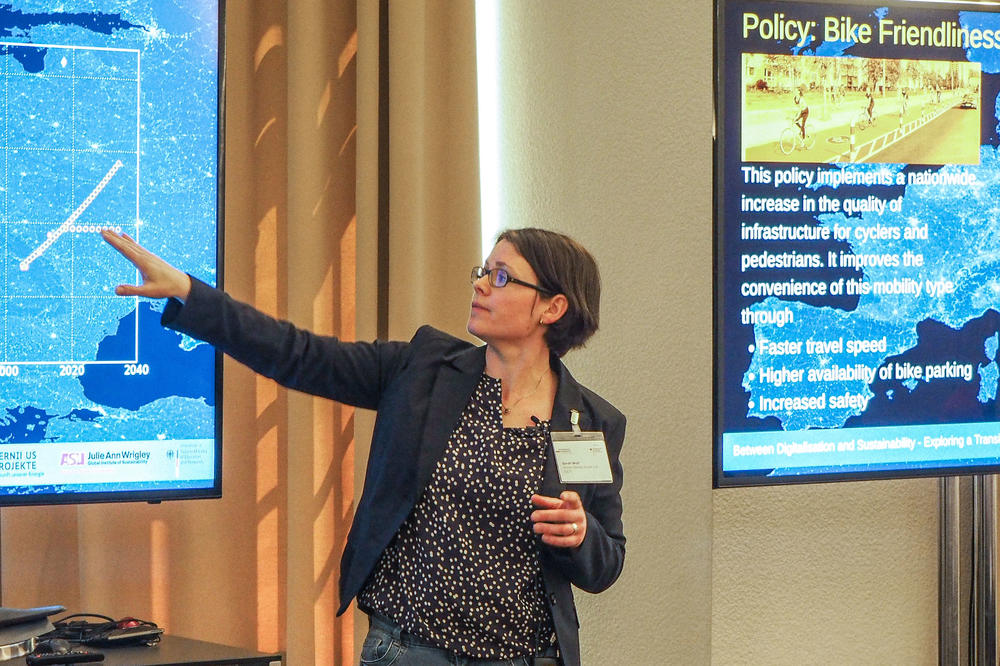Calculating Sustainable Solutions
Shaping the ecological turnaround: Mathematician Sarah Wolf analyzes agent-based modeling for sustainability issues.
Apr 14, 2021
The language of math: Working in the field of mathematics, Sarah Wolf tackles issues in ecology and provides clear-cut definitions.
Image Credit: Jan-Hendrik Niemann
The small calculators are very popular on the internet: You can move the controls a little and see how not eating meat or switching to public transportation can improve your individual climate balance. In principle, the models that mathematician Sarah Wolf is working on at Freie Universität function in a similar way. They too simulate the impact that certain decisions or measures would have on the economy, society, and the environment. But these agent-based models, as they are called, are much larger and more complex. As Dr. Wolf explains, “For example, we can represent all the people in Germany as a ‘synthetic population.’ We can then calculate not only the individual climate balances, but also those resulting from the interactions between decisions made by many actors.”
Working Together to Explore Societal Decision Making
Dr. Wolf is currently setting up the “Mathematics for Sustainability Transitions” junior research group in the Biocomputing section of the Institute of Computer Science at Freie Universität. She leads the junior research group as part of the MATH+ Cluster of Excellence, which is funded by the Excellence Strategy of the German federal and state governments. The cluster is a joint project of Freie Universität, Humboldt-Universität, and Technische Universität in cooperation with the Weierstrass Institute for Applied Analysis and Stochastics and the Zuse Institute Berlin. Similar models have been used in ecology for a long time, for example, to simulate how the development of an overall system results from the behavior of many individual plants or animals. For some time now they have also been used to represent the behavior of people, households, companies, or countries. These are then represented in the model as “agents.”
Using Mathematics to Improve the Models
When programming, the developers have to make assumptions so that the computers can simulate the decisions of the agents and their effects in the overall system. There are, however, no generally recognized standard assumptions available, such as those for many scientific models, e.g., in physics or chemistry. That is why the simulated dynamics are not always understandable, says Wolf. She wants to develop basic mathematical structures that can be used to analyze the models better and faster. That would also make it easier to program new models or adapt them to varying questions.
Expanding the Niche
Wolf says she inherited her interest in mathematical challenges as a “family disease”; both of her parents have degrees in mathematics. After graduating from high school, she moved from Essen in the Ruhr area of western Germany to Berlin to study math at Humboldt-Universität. She specialized in stochastics, i.e., probablity theory and statistics. “While I was a student, the applications revolved primarily around financial markets,” she says, continuing, “Option prices, portfolios, and profit maximization were not my world.” She came into contact with sustainability sciences through a doctoral position at the Potsdam Institute for Climate Impact Research (PIK). She points out, “At the moment, using math to promote sustainability is still a niche. Expanding this area would be very worthwhile.”
Research on environmental topics is mostly interdisciplinary, so translating from one technical language into another is an important prerequisite. “At PIK, we used mathematics as a language to find unambiguous definitions for terms that in the literature are often said to be unclear, for example, what it means to describe an ecosystem as ‘vulnerable.’”
Important Exchange
After completing her doctorate at PIK, Wolf worked in an interdisciplinary team for the Global Climate Forum, a Berlin-based nonprofit association of researchers and institutes, nongovernmental organizations, and companies aiming to stimulate open debates on climate issues. For their work, agent-based models that are used at events in a so-called “Decision Theater,” a discussion room, have proven to be particularly effective.
That is the second difference to the small CO2 calculators on the internet: The participants do not just move the controls any which way, but rather they exchange information about how the system works and which decisions would make sense. The combination of trial and error with the model and discussion in the group, which includes experts working in sustainability, enriches the research process. Wolf says, “One of the strengths of this modeling is that the participants can identify with the agents. With their ideas, they can also help us to improve the model.”
Benefits from the Turnaround for Everyone
A mobility transition is the topic of agent-based modeling in the “Decision Theater” of the Global Climate Forum. Further Decision Theater research will be funded by the “Experimental Laboratories” funding line of the Berlin University Alliance. In her research at Freie Universität, Wolf now wants to make the models faster and easier to apply to other issues. Modeling can already provide scientific support for decision makers, for example, in discussions on the implementation of the European Green Deal. “Modeling makes a system more transparent for everyone involved,” Wolf says. “This should help to shape an ecological turnaround in such a way that not only the environment, but also the economy and society will benefit.”
This text originally appeared in German on February 20, 2021, in the Tagesspiegel newspaper supplement published by Freie Universität.
Further Information
Dr. Sarah Wolf, Freie Universität Berlin, Department of Mathematics and Computer Science, Biocomputing Group, Email: sarah.wolf[at]fu-berlin.de

